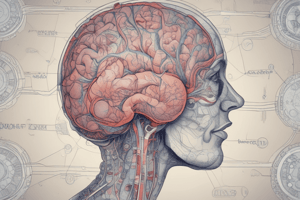Podcast
Questions and Answers
What is the role of cortisol in the body?
What is the role of cortisol in the body?
- It activates the physiological 'fight or flight' response. (correct)
- It helps in the growth of new neurons.
- It increases pain sensitivity during stress.
- It promotes relaxation and calmness.
How do genes influence psychological traits?
How do genes influence psychological traits?
- Genes do not play any role in individual differences.
- They exclusively determine all psychological traits.
- They provide a hereditary blueprint, influenced by the environment. (correct)
- They can only affect traits when environmental factors are absent.
What does polygenic inheritance involve?
What does polygenic inheritance involve?
- Environmental factors overriding genetic factors.
- Single genes solely determining traits.
- Multiple genes contributing to a single trait. (correct)
- The inheritance of psychological traits through parenting only.
What do gene-environment interactions imply?
What do gene-environment interactions imply?
Which statement about evolutionary psychology is true?
Which statement about evolutionary psychology is true?
What biological factors can contribute to psychological disorders?
What biological factors can contribute to psychological disorders?
How do neurotransmitter imbalances relate to mental disorders?
How do neurotransmitter imbalances relate to mental disorders?
What does the evolutionary approach aim to understand?
What does the evolutionary approach aim to understand?
What role do neurotransmitters play in the brain?
What role do neurotransmitters play in the brain?
Which structure of the brain is primarily responsible for higher-level cognitive functions such as language and reasoning?
Which structure of the brain is primarily responsible for higher-level cognitive functions such as language and reasoning?
How do hormones affect behavior?
How do hormones affect behavior?
What is the primary function of the cerebellum in the brain?
What is the primary function of the cerebellum in the brain?
Which of the following neurotransmitters is associated with mood regulation?
Which of the following neurotransmitters is associated with mood regulation?
In what way does genetics contribute to psychological traits?
In what way does genetics contribute to psychological traits?
What is the primary purpose of neuroimaging techniques like fMRI and PET?
What is the primary purpose of neuroimaging techniques like fMRI and PET?
What does evolutionary psychology suggest about psychological traits?
What does evolutionary psychology suggest about psychological traits?
Flashcards
Biological Psychology
Biological Psychology
The study of how the brain and other biological systems influence our thoughts, feelings, and behaviors.
Neurons
Neurons
Specialized cells in the nervous system that communicate with each other to transmit information throughout the body.
Brain
Brain
The primary organ responsible for processing information, controlling behavior, and regulating bodily functions.
Neurotransmitters
Neurotransmitters
Signup and view all the flashcards
Cerebral Cortex
Cerebral Cortex
Signup and view all the flashcards
Hormones
Hormones
Signup and view all the flashcards
Evolutionary Psychology
Evolutionary Psychology
Signup and view all the flashcards
Neuroimaging Techniques
Neuroimaging Techniques
Signup and view all the flashcards
Stress Hormones
Stress Hormones
Signup and view all the flashcards
Genes and Traits
Genes and Traits
Signup and view all the flashcards
Polygenic Inheritance
Polygenic Inheritance
Signup and view all the flashcards
Adaptive Value of Psychology
Adaptive Value of Psychology
Signup and view all the flashcards
Biological Influences on Disorders
Biological Influences on Disorders
Signup and view all the flashcards
Brain Changes in Disorders
Brain Changes in Disorders
Signup and view all the flashcards
Neurotransmitter Imbalances
Neurotransmitter Imbalances
Signup and view all the flashcards
Study Notes
Biological Basis of Psychology
- Psychology is the scientific study of the mind and behavior, with biology providing the fundamental understanding of the physical mechanisms underlying these processes.
- The brain, composed of neurons, is the primary organ involved in psychological functions.
- Neurons communicate through electrochemical signals, facilitated by neurotransmitters that carry messages across synapses.
- Specialized brain regions contribute to various cognitive and behavioral aspects; the cerebral cortex is crucial for higher-level cognitive functions like language and reasoning.
- Hormones, chemical messengers in the bloodstream, influence behavior and emotions, alongside the endocrine system.
- Genetics influence individual differences in psychological traits, with inherited genes contributing to predispositions for specific psychological disorders, though environmental factors are also vital.
- Evolutionary psychology explores how evolutionary pressures have shaped psychological traits, behaviors, and cognitive processes, suggesting many traits evolved to address adaptive problems faced by ancestors.
Brain Structure and Function
- Distinct brain regions have specialized functions, including the cerebrum, cerebellum, and brainstem.
- The cerebrum is responsible for higher-level cognition, sensory perception, and voluntary movement.
- The cerebellum coordinates movement and balance.
- The brainstem controls essential body functions such as breathing and heart rate.
- Various brain areas regulate distinct sensory and motor activities; the visual cortex processes visual information.
- Neuroimaging techniques like fMRI (functional magnetic resonance imaging) and PET (positron emission tomography) allow real-time study of brain activity.
Neurotransmitters and Hormones
- Neurotransmitters are chemical messengers that transmit signals across synapses between neurons.
- Common neurotransmitters include dopamine, serotonin, norepinephrine, and GABA, each influencing behavior, mood, and cognition differently.
- Hormones are chemical messengers secreted by endocrine glands.
- Hormones like testosterone and estrogen influence sexual development and behavior, while stress hormones like cortisol activate the "fight or flight" response.
- Neurotransmitters and hormones interact to produce complex behaviors and mental states.
Genetics and Behavior
- Genes, units of hereditary information, provide the blueprint for building and maintaining an organism.
- Genes contribute to individual differences in psychological traits, but environmental influences also significantly shape these differences.
- Polygenic inheritance implies multiple genes influence a single trait.
- Gene-environment interactions determine how genetically predisposed individuals express or restrain certain traits.
- Genetic predispositions can increase the likelihood of developing specific psychological disorders, like depression or schizophrenia.
Evolutionary Psychology
- Evolutionary psychology examines how natural selection has shaped psychological traits and behaviors.
- Psychological characteristics, such as problem-solving abilities, have adaptive value.
- Some evolutionary perspectives suggest psychological mechanisms like mate selection strategies are evolved responses to ancestral challenges.
- The evolutionary approach helps understand human behavior's universality and diversity across cultures and environments. Addressing questions about the origins and functions of psychological traits.
Biological Influences on Psychological Disorders
- Biological factors, including genes, brain structure/function, and neurotransmitter imbalances, influence psychological disorder development.
- Diseases like Alzheimer's and Parkinson's are linked to specific brain structural and chemical changes.
- Various mental disorders, such as depression and anxiety, may have biological roots, potentially involving imbalances in neurotransmitter systems.
- Genetic predispositions heighten the risk of certain disorders, highlighting the complex interplay between genes and environment.
- Treatments for psychological disorders can involve medications targeting specific biological systems.
Studying That Suits You
Use AI to generate personalized quizzes and flashcards to suit your learning preferences.




